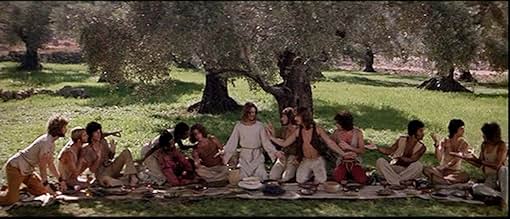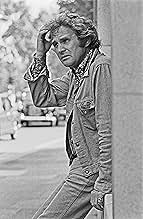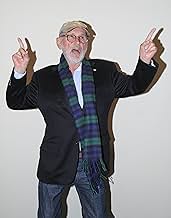IMDb-BEWERTUNG
7,3/10
31.540
IHRE BEWERTUNG
Verfilmung des Musicals über die letzten Wochen von Jesus Christus, die auf anachronistische Weise erzählt werden.Verfilmung des Musicals über die letzten Wochen von Jesus Christus, die auf anachronistische Weise erzählt werden.Verfilmung des Musicals über die letzten Wochen von Jesus Christus, die auf anachronistische Weise erzählt werden.
- Regie
- Drehbuch
- Hauptbesetzung
- Für 1 Oscar nominiert
- 3 Gewinne & 13 Nominierungen insgesamt
Larry Marshall
- Simon Zealotes
- (as Larry T. Marshall)
Josh Mostel
- King Herod
- (as Joshua Mostel)
Kurt Yahjian
- Annas
- (as Kurt Yaghjian)
Paul Thomas
- Peter
- (as Philip Toubus)
Jeff Hyslop
- Apostle
- (as Jeffrey Hyslop)
Empfohlene Bewertungen
The Lloyd-Webber and Rice musical comes to the screen, and is nothing like the stage show at all. The deserts are real, although the back story is that this is a theatre company, putting on a production in real locations.
The cast are largely session singers and unknowns - Ted Neeley, delicate and high-voiced as Jesus (particularly superb in `Gethsemane'); Carl Anderson, black and doe-eyed as Judas with hot soul vocals, Barry Dennen as Pilate, and Yvonne Elliman as Magdelene with her big number `I Don't Know How To Love Him'.
One loss for those who know the stage version is being removed from the crucifixion preamble, when the ghost of Judas sings `Superstar' - this was all video camera projection in the theatre, while in the movie we are detached observers. But at other times we get uncomfortably close. And the songs survive the transportation to a more realistic setting (except the added `Could We Start Again, Please?' which sounds rather too much like the Coca-Cola theme for comfort).
Best scenes? The one in the temple; Hosanna; and the Pharisees tapping on their scaffolding perches like crows.
The cast are largely session singers and unknowns - Ted Neeley, delicate and high-voiced as Jesus (particularly superb in `Gethsemane'); Carl Anderson, black and doe-eyed as Judas with hot soul vocals, Barry Dennen as Pilate, and Yvonne Elliman as Magdelene with her big number `I Don't Know How To Love Him'.
One loss for those who know the stage version is being removed from the crucifixion preamble, when the ghost of Judas sings `Superstar' - this was all video camera projection in the theatre, while in the movie we are detached observers. But at other times we get uncomfortably close. And the songs survive the transportation to a more realistic setting (except the added `Could We Start Again, Please?' which sounds rather too much like the Coca-Cola theme for comfort).
Best scenes? The one in the temple; Hosanna; and the Pharisees tapping on their scaffolding perches like crows.
I saw this film for the first time in the mid 70's at a cinema on a school organised outing, I remember being peeved as it was being shown on TV for the first time the same evening. I was aware of one or two of the songs but I had never heard the original concept album before hand so I really had no idea what to expect. I was transfixed from the Overture to the End Titles and probably have not had a more moving experience watching a film since. I have been a devoted fan of this film now for over 25 years and still find the occasional viewing moving. The film was unique, the first Rock Opera given the Big Screen treatment and this is still in my opinion the best of its genre. Of course the Music and Lyrics are the fulcrum of the film and the numerous album recordings are still popular now because the songs are so unforgettable but the performances of all the principle characters in this original film version give this interpretation a dynamic edge. All the cast probably give their definitive performances but without any doubt Carl Anderson as Judas is the real KING. Rest In Peace. For all you long term fans like me get the new Region 1 DVD special edition with improved sound and picture quality and extras especially the commentary with Norman and Ted- you'll cry your heart out. Thanks Carl, I will never forget the impact your performance has made on my life. Thank you ALW, Tim Rice and Norman Jewison for an unforgettable Spiritual experience.
10vpup01
My mom (a hard-core Lutheran) thought this movie, "Jesus Christ Superstar" would deepen our faith in religion. She took me (age 12), my brother (age 14), my sister (age 11) and several neighborhood kids all the way across town where our minds proceeded to be "blown" in the most amazing, positive way! Those were the days when you could stay and watch the movie over and over and over (without buying another ticket). I walked out of the Georgetown Theatre in Indianapolis, Indiana suddenly knowing that somewhere in this big bleak world, I may actually fit in for once. All the previously-boring religious training I'd endured (parochial school) suddenly made some kind of sense and my idea of who and what God is, was and could be was changed forever! I still watch this film when I feel down and out and always feel spiritually renewed. The dancing, costumes, singing, story, cinematography, not to mention the hippie-themed visual fun-fest continues to thrill and amaze me! I give it two thumbs way way way up! P.S. I watched it three times that August day back in 1973......best time I EVER invested.
I've heard much criticism of this film over many years, and the most annoying criticism is that it didn't have the vitality of the stage productions back "in the day". There isn't much many of us can do about that, though I did see a road production of it about 7 or 8 years ago.
The most interesting thing about this film is that it was set in "modern" times, rather than in biblical times. Roman soldiers wearing shiny helmets, and carrying machine guns is a real attention grabber. The ruins used in the film added another fascinating aspect to the production. In short, the anachronistic approach in the visuals, the lyrics, and the music itself make this a genuinely unique, and clever film.
I thought all the acting, singing, and dancing was great, and still appears to be rather fresh and modern. The lyrics were the most memorable of any movie I've ever seen. There were many of us that could quickly memorize the entire opera from listening to the soundtrack (no videos back then), and have much fun "play acting" ourselves.
The use of Judas as a primary character was probably the single most important aspect of the film. One has to wonder how Judas became one of the inner circle of disciples if he was such an evil crud to begin with. In church he is simply mentioned as being a traitor. The film/musical asks us to think more on this individual, and speculate as to his true nature as a human being. The only other person I know of that attempted to do this was Taylor Caldwell in her novel "I Judas". The point that the crucifixion/resurrection hinged on the betrayal of Judas, should make any Christian wonder if God actually worked through him, and that he wasn't actually "damned for all time."
People seem to be offended by the light-hearted (and hysterically funny!) "King Herod's Song." What does the Bible say about this meeting? Certainly it doesn't say that this was an amicable meeting, and indeed, I seem to remember Jesus being beaten on the palace grounds. The look on Neely's face throughout the Herod song-and-dance is one of seriousness that belies the true nature of what was going on in this scene. This served to remind the viewer that this wasn't sheer levity, and held the scene together in its proper context until it ran full circle with Herod "spazzing" and showing rabid, rather than merely sarcastic hatred for Christ at the end. This was sheer genius and master film craft in my book. I don't think Jesus' expression would come out as well in the stage version. The reservations Pilate had about authorizing the crucifixion seem to come out in the Bible as well. So-called Christians hold Pilate responsible, though there was probably many political things going on that are only vaguely alluded to in the Bible. Non-biblical tradition says that he and his wife, Claudia Procula, eventually converted to Christianity themselves. Who knows?
My least-favorite parts: "I Don't Know How to Love Him" reminds me a lot of "As Long as He Needs Me" in Oliver!. Both songs are plodding, and brings each film to a screeching halt. I believe that this was actually intended to be a pop song, but was thrown in when Webber and Rice were composing the opera. Still, Judas singing this through his tears towards the end of the film was very chilling. "Hosanna, Hosanna" I also find to be rather trite...still...the last stanza never fails to give me goose bumps when the crowd asks if Christ will die for them. Simon Zealot's prolonged screaming (and off key/beat) never fails to annoy me...then again, he was a rebellious zealot after all. The "falling down push up" move in this dance sequence bugs me, too. Another part that bothers me is that suddenly it was Pilate's dream, rather than his wife's as stated in the bible. I guess they did this to narrow the canvas (simplify the number of key characters). But, what a beautiful song! And, I thought the fact that nobody in the cast looked to be much over 25 was kind of weird.
My favorite parts: Caiphas' baritone and Annas' falsetto counterpoint. "Too Much Heaven on Their Minds." The guy with the froggy voice heckling Christ as he's shuffled between Herod and Pilate. The gorgeous girl in the purple shirt (dancer in the Zealot scene)...WHO IS SHE????? Any scene with Judas in it. The montage of crucifixion scenes. The great guitar (all the instrumentation for that matter), and something I wish they had MUCH more of in the movie, that incredible electric piano. I would buy just the instrumental track if it was available.
The most interesting thing about this film is that it was set in "modern" times, rather than in biblical times. Roman soldiers wearing shiny helmets, and carrying machine guns is a real attention grabber. The ruins used in the film added another fascinating aspect to the production. In short, the anachronistic approach in the visuals, the lyrics, and the music itself make this a genuinely unique, and clever film.
I thought all the acting, singing, and dancing was great, and still appears to be rather fresh and modern. The lyrics were the most memorable of any movie I've ever seen. There were many of us that could quickly memorize the entire opera from listening to the soundtrack (no videos back then), and have much fun "play acting" ourselves.
The use of Judas as a primary character was probably the single most important aspect of the film. One has to wonder how Judas became one of the inner circle of disciples if he was such an evil crud to begin with. In church he is simply mentioned as being a traitor. The film/musical asks us to think more on this individual, and speculate as to his true nature as a human being. The only other person I know of that attempted to do this was Taylor Caldwell in her novel "I Judas". The point that the crucifixion/resurrection hinged on the betrayal of Judas, should make any Christian wonder if God actually worked through him, and that he wasn't actually "damned for all time."
People seem to be offended by the light-hearted (and hysterically funny!) "King Herod's Song." What does the Bible say about this meeting? Certainly it doesn't say that this was an amicable meeting, and indeed, I seem to remember Jesus being beaten on the palace grounds. The look on Neely's face throughout the Herod song-and-dance is one of seriousness that belies the true nature of what was going on in this scene. This served to remind the viewer that this wasn't sheer levity, and held the scene together in its proper context until it ran full circle with Herod "spazzing" and showing rabid, rather than merely sarcastic hatred for Christ at the end. This was sheer genius and master film craft in my book. I don't think Jesus' expression would come out as well in the stage version. The reservations Pilate had about authorizing the crucifixion seem to come out in the Bible as well. So-called Christians hold Pilate responsible, though there was probably many political things going on that are only vaguely alluded to in the Bible. Non-biblical tradition says that he and his wife, Claudia Procula, eventually converted to Christianity themselves. Who knows?
My least-favorite parts: "I Don't Know How to Love Him" reminds me a lot of "As Long as He Needs Me" in Oliver!. Both songs are plodding, and brings each film to a screeching halt. I believe that this was actually intended to be a pop song, but was thrown in when Webber and Rice were composing the opera. Still, Judas singing this through his tears towards the end of the film was very chilling. "Hosanna, Hosanna" I also find to be rather trite...still...the last stanza never fails to give me goose bumps when the crowd asks if Christ will die for them. Simon Zealot's prolonged screaming (and off key/beat) never fails to annoy me...then again, he was a rebellious zealot after all. The "falling down push up" move in this dance sequence bugs me, too. Another part that bothers me is that suddenly it was Pilate's dream, rather than his wife's as stated in the bible. I guess they did this to narrow the canvas (simplify the number of key characters). But, what a beautiful song! And, I thought the fact that nobody in the cast looked to be much over 25 was kind of weird.
My favorite parts: Caiphas' baritone and Annas' falsetto counterpoint. "Too Much Heaven on Their Minds." The guy with the froggy voice heckling Christ as he's shuffled between Herod and Pilate. The gorgeous girl in the purple shirt (dancer in the Zealot scene)...WHO IS SHE????? Any scene with Judas in it. The montage of crucifixion scenes. The great guitar (all the instrumentation for that matter), and something I wish they had MUCH more of in the movie, that incredible electric piano. I would buy just the instrumental track if it was available.
Although I have been aware of this musical, seemingly forever, I just very recently saw the whole movie on dvd. Unfortunately, while I was acquainted with many of the songs before, I had never really seen it in its entirety before, and I'm not sure why. Also, I've never seen it as a live stage show, be it on Broadway, in London or down the street at the local high school ...
So, then, I can only rate it as a singular movie experience, not comparing it with the Broadway or London stagings. Also, being Jewish and never really studying the life and crucifixion of Jesus, I don't have any strong or pre-conceived spiritual ties to the story.
For me, then, this is a cleverly written and very well-performed musical, that mixes irreverence, time juxtapositions and genuine emotions of sadness and wistfulness. I'm not sure that the movie enhances the great musical; in other words, now that I've seen the movie, I regularly listen to the cd of the musical, and enjoy both about equally. For me, Carl Anderson, as Judas, is the standout, but Ted Neeley does bring an angelic quality to the title character. all of the other supporting roles, including Yvonne Elliman, are done well.
I rate it 8/10 for its excellent music, good staging and for what seems like a faithful film-ization of the original..worth watching for sure!
So, then, I can only rate it as a singular movie experience, not comparing it with the Broadway or London stagings. Also, being Jewish and never really studying the life and crucifixion of Jesus, I don't have any strong or pre-conceived spiritual ties to the story.
For me, then, this is a cleverly written and very well-performed musical, that mixes irreverence, time juxtapositions and genuine emotions of sadness and wistfulness. I'm not sure that the movie enhances the great musical; in other words, now that I've seen the movie, I regularly listen to the cd of the musical, and enjoy both about equally. For me, Carl Anderson, as Judas, is the standout, but Ted Neeley does bring an angelic quality to the title character. all of the other supporting roles, including Yvonne Elliman, are done well.
I rate it 8/10 for its excellent music, good staging and for what seems like a faithful film-ization of the original..worth watching for sure!
Wusstest du schon
- WissenswertesNorman Jewison managed only two takes of "The Temple" before he ran out of unbroken props, due to Ted Neeley's unrestrained energy when Jesus smashes everything.
- PatzerDifferences from the source material are not to be counted as goofs. Historical inaccuracies, such as tanks and guns in the year 0033, are also not counted as goofs, especially when related to artistic decisions.
- VerbindungenFeatured in Große Regisseure: The Films of Norman Jewison (1999)
Top-Auswahl
Melde dich zum Bewerten an und greife auf die Watchlist für personalisierte Empfehlungen zu.
Details
- Erscheinungsdatum
- Herkunftsland
- Sprache
- Auch bekannt als
- Jesucristo Superstar
- Drehorte
- Dead Sea, Israel(King Herod's Song)
- Produktionsfirma
- Weitere beteiligte Unternehmen bei IMDbPro anzeigen
Box Office
- Weltweiter Bruttoertrag
- 101.975 $
- Laufzeit1 Stunde 46 Minuten
- Farbe
- Seitenverhältnis
- 2.39 : 1
Zu dieser Seite beitragen
Bearbeitung vorschlagen oder fehlenden Inhalt hinzufügen

Oberste Lücke
By what name was Jesus Christ Superstar (1973) officially released in India in English?
Antwort




























